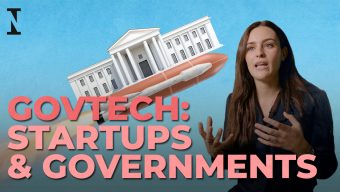We live in the age of transformation. Technologies are flooding the market and business models are changing as new systems take hold. Consumers have changed, as well: our lifestyles and shopping habits are vastly different from those of even the recent past. And the wheel keeps on turning. Over the next decade, we will see more changes in the market than in the last 250 years. Missions to Mars. The Hyperloop. Electric mobility within cities. These projects—and many more—are planting seeds that will sprout into the next big planetary transformation.
Who is driving this future? What is the key to disruption? The answer clearly lies in the mindset of business leaders who, beyond launching innovative products and services, aspire to transform the market itself.
The most innovative leaders are those who dare to envision a new environment, change the rules, eliminate boundaries, and cast aside standards that still work.
The gamechangers
The key to developing this sort of leadership has to do with the market itself. The most innovative leaders are those who dare to envision a new environment, change the rules, eliminate boundaries, and cast aside standards that still work. By sparking the interest of the real referees—consumers—these leaders differentiate themselves from the other players in the game. Companies like Airbnb have shown us how it’s done: set up shop, get a foothold, and rewrite the rules of play.
Across the globe, I have met more than two hundred gamechangers who embody an innovative new spirit characterized by a few common traits:
- Audacity. Gamechangers don’t hesitate to reshape the market they operate in. They dare to go beyond conventions. By definition, they are visionaries.
- Purpose. Gamechangers know that social benefits are just as important as profits. Their plans are driven by a desire to impact people’s lives more significantly.
- Collaboration and intelligence. Projects don’t just happen by themselves; they require networked cooperation. Physical and virtual collaborative platforms accelerate processes, while smart technologies and artificial intelligence efficiently and qualitatively propel the entire system forward.
The CEOs of the future will double as hackers and entrepreneurs as they experiment purposefully and work to scale their projects.
Think and lead from five years ahead
This approach ought to be within reach for most companies. Why, then, is true innovation in the hands of so few? Mindset is the crux of the matter. Many of today’s leaders are trying to squeeze whatever they can out of old models that led to past success and greatness. But in these transformative times, the expiration date on success is just around the corner for those who are not innovative or entrepreneurial.
To be truly disruptive, you have to start five years ahead and work backwards from there. Experimenting, planning, and failing is the new norm. Every day should feel like your first day at work. This is the thought process that Amazon CEO Jeff Bezos has tried to convey to his teams. Bezos highlights the importance of the emotional components of executive leadership. The ability to interpret and shape reality while detecting opportunities for projects requires more than just technical knowledge.
Likewise, inventing a new market requires optimism in the face of risk and the ability to spread this spirit throughout the entire organization. China’s Zhang Ruimin recognized this in reimaging Haier, with an organization built on 10,000 entrepreneurial businesses. If the future is the best “workplace,” then persistence, trust, and bravery must be the hallmarks of an executive’s personality.
The CEOs of the future will double as hackers and entrepreneurs as they experiment purposefully and work to scale their projects, like Anne Wojcicki has done at 23andMe, the DNA profiling business that is transforming healthcare. Agile decision-making will be essential not only for the top brass but for all collaborators, since the most groundbreaking innovations arise from interconnections among people and ideas.
In these transformative times, the expiration date on success is just around the corner for those who are not innovative or entrepreneurial.
Working from the future back
Working backwards from the future like Elon Musk involves numerous inspirational challenges that have been internalized by gamechangers such as Netflix, Inditex, and Novo Nordisk. These companies have learned a lot from their competitors, but they also know that the most valuable information comes from their customers. Data analytics ensure a continuous stream of insight and can drive “self-tuning” strategies, like at Alibaba. Still, real industry-wide transformations tend to stem fundamentally from ideas. Rule-breaking is a consequence of creativity and thought processes that eschew conventionalisms.
Today’s businesses need to balance a strategic path through complexity to shape markets in their own vision while also staying agile and responsive to ever-changing environments. This means they need to resolve old paradoxes like how to be global and local, digital and physical, consistent and adaptive, strategic and tactical at the same time. The ability to be guided by the outside world, to synchronize internal and external change, and to stay close to customers is the way to reconcile these apparent contradictions and one of the keys to success. Powerful technological tools such as augmented reality, blockchain, 3D printing, and artificial intelligence enable us to solve problems, find an advantage, and accelerate growth in new ways.
© IE Insights.











